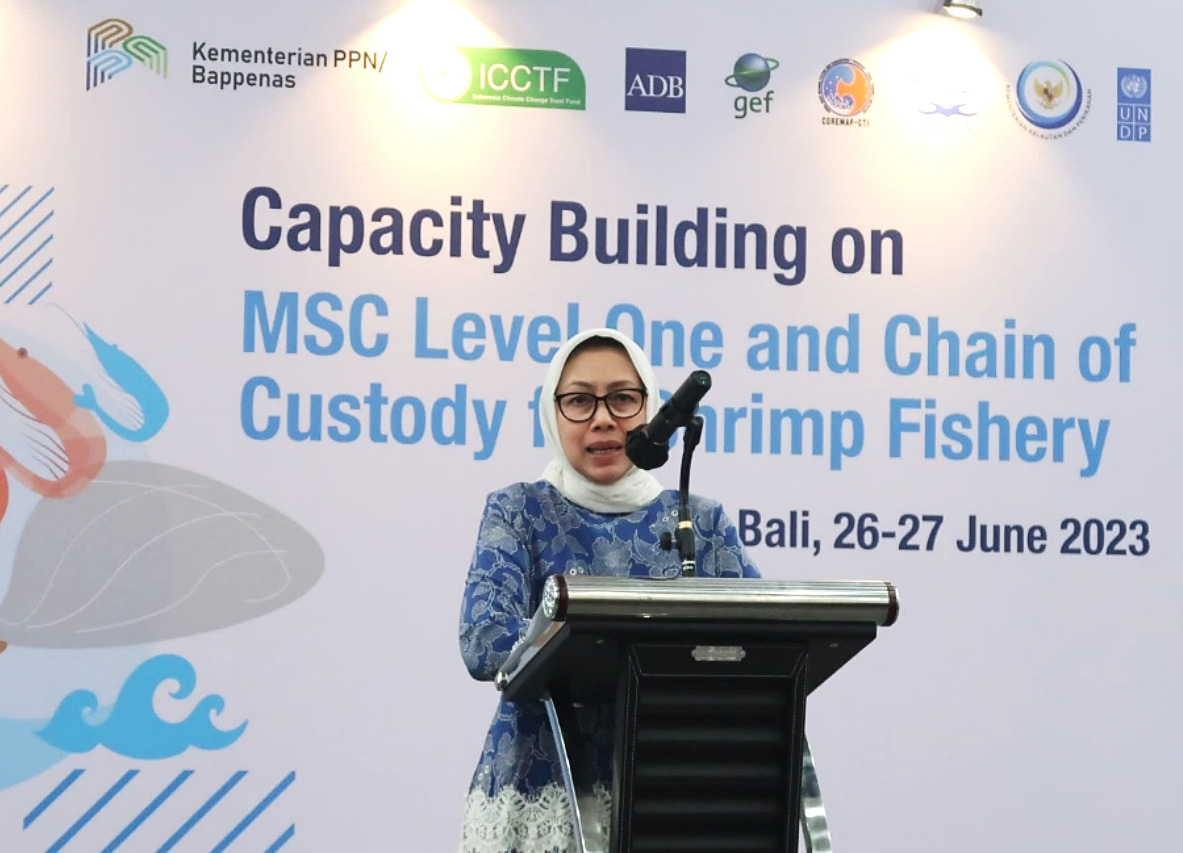The ATSEA-2 Project recently teamed up with the Coral Reef Rehabilitation and Management Project-Coral Triangle Initiative (COREMAP-CTI) to organise a comprehensive two-day capacity building program for the Marine Stewardship Council (MSC). The event took place from 26-27 June 2023 in Bali, Indonesia.
The main objective of the training was to enhance the knowledge and skills of shrimp fisheries business actors and policy makers in Indonesia. By focusing on MSC fishery standards and chain of custody, the program aimed to facilitate and expedite improvements to shrimp fisheries management on a national scale.
In total, 50 participants attended the program, representing various institutions. These included Indonesia’s shrimp companies, the Ministry of National Development Planning, the Bali Fisheries and Marine Agency, the West Nusa Tenggara Fisheries and Marine Agency, the Maluku Fisheries and Marine Agency, the Aru Archipelago Fisheries Agency, the Association of Indonesia Shrimp Entrepreneurs (Himpunan Pengusaha Penangkapan Udang Indonesia/HPPI), the Association of Tuna Longline Indonesia (ATLI), the Association of Demersal Indonesia (ADI), the FIP Asia Pacific Indonesia region, as well as fisheries practitioners and researchers from universities.

Sri Yanti, the Marine and Fisheries Director of the Ministry of National Development Planning (Bappenas), delivered an opening speech on the first day of the event. In her address, she highlighted the importance of increasing the value of Indonesian seafood in the international trade market, particularly within the shrimp category. Sri Yanti also emphasised the obligation to sustain ecological services by obtaining eco-label certification.
During the first day, a total of six speakers shared their insights and experience of fisheries improvements related to various fisheries commodities. They covered a range of topics, from policy measures supporting the program to success stories of shrimp industry players who have successfully obtained eco-label certification.
During the first session, Aris Budiarto from the Directorate of Fish Resources at the Ministry of Marine Affairs and Fisheries (MMAF) and Jaya Wijaya from the Directorate of Marketing at the Directorate General of National Export Development provided an overview of the Indonesian government’s current efforts and policies in supporting the shrimp fisheries improvement program. These initiatives aim to align with global market values while ensuring the sustainable management of marine commodities.
Wijaya highlighted that in 2022 Indonesia’s shrimp exports to the global market were valued at USD 2.16 billion, making it the country’s top fisheries export product. Notably, the export volume of processed frozen shrimp increased by 16.13% from 2019. Given this context, the Indonesian government plays a crucial role in facilitating and expanding access to both domestic and international markets. This includes strengthening the logistics of the raw material supply chain, promoting and developing branding initiatives, and facilitating trade missions and business meetings between national shrimp companies and international buyers.
During the second session of the event, Martin Purves, the Managing Director of the International Pole and Line Foundation (IPNLF), and Annie Jarrett, the CEO of The Northern Prawn Fishery Industry Pty (NPF), participated virtually and shared their experiences in obtaining MSC certification for tuna fisheries in Indonesia (IPNLF) and shrimp fisheries in Australia (NPF). Since completing the seven-year journey to obtain MSC certification, IPNLF has experienced a range of benefits, including access to new markets, an enhanced profile for Indonesia’s tuna fisheries and incentivised improvements.
Djoko Kusyanto from HPPI provided insights into the shrimp fishery profile in Arafura during the training session. It was revealed that at least eight members of HPPI, representing shrimp companies, operated in the Arafura seas – primarily in Fisheries Management Area (FMA) 718.
To provide participants with a better perspective on assessing product eligibility for eco-labeling based on the three MSC principles (i.e., sustainable stock, environmental impact and effective management/governance), trainers conducted an interactive exercise in which participants were encouraged to roleplay the work of MSC Assessors.
In 2020, the Aru Archipelago Shrimp Fisheries Initial Pre-Assessment and Gap Analysis Report highlighted that shrimp fisheries in Aru did not meet the global standards set by MSC and required immediate improvements through a Fishery Improvement Project (FIP) and a specific action plan. However, it is noteworthy that the production of wild-caught shrimp in FMA 718 has grown exponentially in recent years, becoming the highest area of growth among the ten FMAs in Indonesia. According to MMAF, production has increased nearly threefold, from 3,465 tonnes in 2018 to 9,321 tonnes in 2021.
Considering that shrimp is a commodity that has been prioritised for sustainable management in FMA 718 under the Fisheries Management Plan, efforts from both the industry and officials are crucial to achieving ideal conditions for sustainable management and utilisation in shrimp fisheries. Therefore, this event served as a platform to promote and implement an FIP through eco-label certification for shrimp fisheries in FMA 718.
During the event, commitments were made by HPPI members, especially the eight shrimp companies that operate in FMA 718, agreeing to join the FIP and register for MSC eco-label certification. Moving forward, collaboration among stakeholders will be crucial to this process. It will involve sharing resources, knowledge, and co-financing that will help to expedite the process of fisheries industry improvements, informed by past experience and lessons learned from other commodities.
By Sila Kartika Sari


